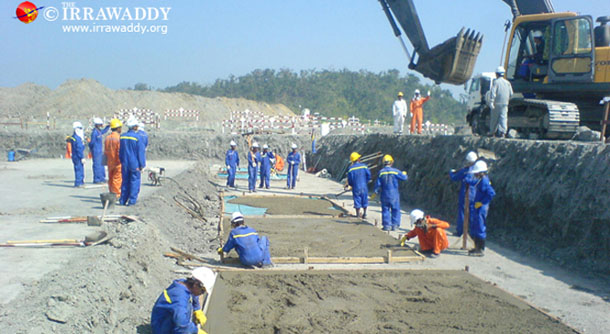BANGKOK — Ten activists on trial for protesting without a permit against a Chinese-led oil and gas project in western Arakan State say they expect to be jailed, in a case rights groups say is typical of a new authoritarianism creeping into Burma.
Tun Kyi, an activist from Maday Island, the westernmost project site, told Thomson Reuters Foundation the defendants expected to be found guilty and jailed when the verdict is handed down in a week or two.
“It’s very rare that cases brought under Article 18 of the Peaceful Assembly Law do not result in prison sentences,” he said by phone from his home.
“If they send us to jail, we’ll go—one month or two months or however long—and after we’ve served time, we’ll continue doing what we need to do. We’re not afraid,” the ethnic Arakanese activist said. “We will continue to protest until they do something about our concerns.”
Rights groups say the case is one of many where the law on public assembly is being systematically used to silence critics as a new form of authoritarianism creeps into Burma, much lauded for its democratic reforms in the past year as it emerged from half a century of brutal military rule.
“These actions show the Burma government’s rights-repressing habits die hard, and where previously it was all about military and national security, now activists are being called up on charges at the behest of government officials and their business cronies who want to push through their projects at any cost,” said Phil Robertson, deputy Asian director for Human Rights Watch.
“This is a critical test for the EU, the US and other donors who crow about reform in Burma but have done little to pressure the government to correct this situation of a so-called ‘reform law’ going bad,” he said.
Tun Kyi is one of 10 activists arrested after demonstrating and holding a peaceful march with hundreds of villagers on April 18 on Maday Island. They were demanding action over grievances against the Shwe Gas project, which includes a deep sea port, natural gas from Burma’s offshore reserves and overland oil and gas pipelines from Arakan to China.
Locals and activists say the project has led to conflict, human rights abuses and environmental degradation. They say local people have lost their jobs and had farmland seized to make way for the project and have been compensated arbitrarily and without consultation.
Thailand-based Shwe Gas Movement, an activist group, said the project will provide Burma, one of the world’s poorest countries with its own crippling energy shortage, with revenues of around $29 billion over the next 30 years.
“We held discussions with the local authorities many times and requested their help before we decided to protest. But they didn’t do anything and the police also didn’t protect the locals,” said Tun Kyi.
Numerous applications to hold a protest were rejected, he said. The police cited security concerns and the presence of an emergency decree imposed after communal violence in Arakan State last year displaced some 140,000 people, most of them stateless Muslim Rohingya.
Tun Kyi said there had been no communal clashes on Maday and no announcement had been made there about an emergency decree.
The activists’ trial began in May. Six defense witnesses made statements on Monday, a number Tun Kyi said the defendants had reduced from 16 so as not to prolong the trial.
The defendants have appeared in court about 10 times, each trip from Maday to the courtroom in Kyaukphyu costing more than $100 in total, including a 90-minute boat ride. “It’s monsoon season now and when the weather is really bad and there are only small boats available, we worry about our lives,” Tun Kyi said.
A New Authoritarianism?
Burma’s first elected government in 50 years, led by former general Thein Sein as president, has been praised for its reforms, including passing a law allowing protests, in a country known for its heavy-handed reaction to demonstrations. Western sanctions have been suspended as governments and companies eye the cash-poor, resource-rich country’s potential.
Over the past year, however, the authorities have arrested and prosecuted land rights activists and anti-mining and peace campaigners for failing to comply with the provisions of The Right to Peaceful Assembly and Peaceful Procession Act, enacted in 2011.
Human Rights Watch said the provisions do not meet international human rights standards and HRW’s Robertson says the law should be amended.
The requirement to apply for police permission for a march or procession should be scrapped and replaced with a simple order that organizers notify the local police before proceeding, he said.
“Furthermore … the provisions of the current law make it a criminal offence to give speeches that “contain false information,” say anything that could hurt the state, or “do anything that causes fear, a disturbance or blocks roads, vehicles or the public,” he said.
“This is discretionary and arbitrary lawmaking at its worst, and given the police and security officials’ poor track record, no one should be surprised they are abusing it,” he added.
Tun Kyi, who was in Burma’s biggest city Rangoon last week for the officially approved commemoration of the 25th anniversary of the 1988 student uprising, said changes in Rangoon and the capital Naypyidaw are not reflected in the provinces.
“The government kept saying they won’t backtrack on the reforms and we could see the top authorities are working on this. But people at the grassroots levels haven’t changed their ways,” said the activist, who faces regular harassment from the authorities. “They’re still behaving in the same repressive way.”















